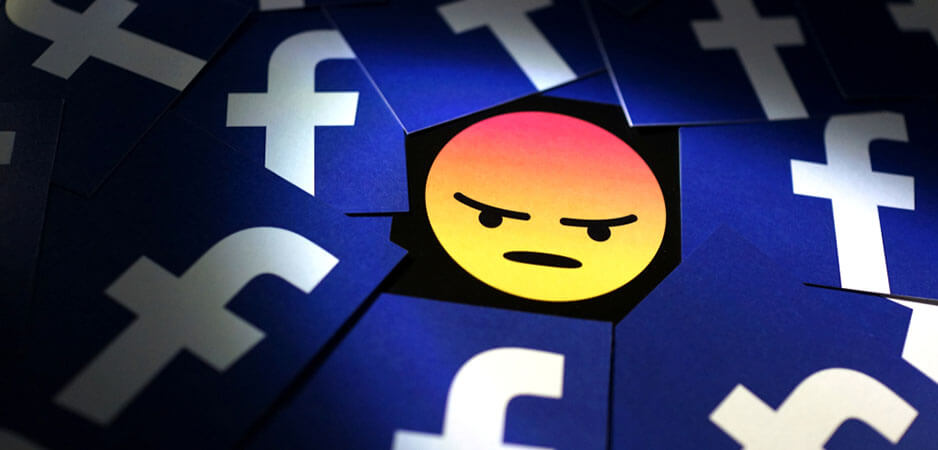Hackers have accessed millions of user profiles in the latest Facebook data breach. The Daily Devil’s Dictionary looks at the latest blunder.
Six months after the Cambridge Analytica scandal became public, Business Insider reveals a new security breach due to a feature of Facebook that gave hackers access to millions of profiles. Shona Ghosh, the author of the article, opines that “Facebook’s latest security blunder is a disgrace” and suggests that the company could potentially “have many billions wiped off its value.”
Here is today’s 3D definition:
Blunder:
The polite, euphemistic name given to a fatally flawed act initially undertaken by a supposedly reputable institution to advance its own interests, while consciously running a risk of massive damage or destruction affecting those whom it is intended to serve. But, hey, what did you expect? That’s the way businesses and governments get things done, isn’t it?
Contextual note
Business Insider attributes this blunder, very much like those that came before it, “to the company’s early, hacky approach to growth and its apparently boundless greed.” This sounds like a combination of willing neglect and amoral (i.e., not consciously immoral) ambition, an attitude associated with the Silicon Valley ethos. This description seems anodyne until we reach the conclusion and final recommendation: “The company doesn’t deserve billions of users’ trust, and the only way to effect change is to leave in droves.”
In an acerbic column at Fair Observer, Atul Singh compares Facebook’s methods to those of the British East India Company in the 19th century. He says, “Opium was the drug of choice for the British East India Company. Social attention is what billions crave today” who feed their habit through Facebook. But the assumption that people in the throes of addiction can decide to “leave in droves” simply because their trust has been betrayed underestimates the force of the addiction.
Without the invention of methadone, would curing heroin addiction for many people be the reality it has become? Do we need something similar for Facebook? It may not be coincidental that the creator of the internet, Tim Berners-Lee, has proposed to “upend the World Wide Web,” to deliver it from the clutches of the corporate mastodons by launching an alternative system that will change the rules of the game on data collection and privacy. Fast Company defines Berners-Lee’s ambition as “to decentralize the web and take back power from the forces that have profited from centralizing it. In other words, it’s game on for Facebook, Google, Amazon.”
No one is better placed morally to get this job done than Berners-Lee, who — violating all the principles of “good capitalist judgment” — designed the World Wide Web and then simply launched it for everyone to use, like a toll-free road. But taxpayers pay for their toll-free roads. And the taxpayers of the web end up paying the toll to the likes of Facebook, Google and Amazon in the form of data and access to advertisers. Parodying Mark Zuckerberg and the masters he hopes to “upend,” Berners-Lee made his position clear: “The intent is world domination.”
The app will be called Inrupt and uses a decentralized technology called Solid. The result is “like a mashup of Google Drive, Microsoft Outlook, Slack, Spotify, and WhatsApp.”
All the data is located in an online personal data store, well beyond the reach of anyone named Mark Zuckerberg, Jeff Bezos or Tim Cook. Glasswing, the venture capital firm backing Inrupt, explains that “individuals and enterprises have control of their data and data is freed from silos, able to be linked across apps and products.” And it’s the owner of the data who will do the linking… and the blundering, if it comes to that, without affecting millions of other users.
Historical note
The notion of blunder has been used in many contexts, often with understatement. Chris Hedges, one of the most cutting and honest critics of the US establishment and its foreign policy, showed himself far too generous, kind and forgiving when he wrote, earlier this year, “The endless wars in the Middle East are the biggest strategic blunder in American history and herald the death of the empire.”
Should wars that have cost officially $5.6 trillion (with another $21 trillion unaccounted for), destabilized an entire region of the globe, provoked massive, tragic waves of migration with the Middle East and Europe, and continue to engage huge military resources be called a blunder or a crime? To call them a crime would require the existence of a tribunal capable of judging them, which of course doesn’t exist in the minds of Americans, even if it does in reality (it’s call the International Criminal Court or ICC).
Everyone has the right to blunder, eventually be forgiven for it and then try to do better. There is, however, one prominent public speaker who never uses a word like blunder: Donald Trump. He prefers to use terms like “con job,” which he has trotted out to describe the Democrats’ criticism of his “outstanding,” “wonderful” candidate for the Supreme Court, Brett Kavanaugh. The Atlantic analyzed his language and pointed out his predilection for this idea: “[P]erhaps the most significant word of all for Trump was a three-letter one: con. More than a dozen times he used it in the phrases con artist, con job, or con game.”
In Trump’s universe everyone is trying to con everyone else, which tells us something about himself. For him, there are no blunders, just failed con jobs.
*[In the age of Oscar Wilde and Mark Twain, another American wit, the journalist Ambrose Bierce, produced a series of satirical definitions of commonly used terms, throwing light on their hidden meanings in real discourse. Bierce eventually collected and published them as a book, The Devil’s Dictionary, in 1911. We have shamelessly appropriated his title in the interest of continuing his wholesome pedagogical effort to enlighten generations of readers of the news.]
The views expressed in this article are the author’s own and do not necessarily reflect Fair Observer’s editorial policy.
Support Fair Observer
We rely on your support for our independence, diversity and quality.
For more than 10 years, Fair Observer has been free, fair and independent. No billionaire owns us, no advertisers control us. We are a reader-supported nonprofit. Unlike many other publications, we keep our content free for readers regardless of where they live or whether they can afford to pay. We have no paywalls and no ads.
In the post-truth era of fake news, echo chambers and filter bubbles, we publish a plurality of perspectives from around the world. Anyone can publish with us, but everyone goes through a rigorous editorial process. So, you get fact-checked, well-reasoned content instead of noise.
We publish 2,500+ voices from 90+ countries. We also conduct education and training programs
on subjects ranging from digital media and journalism to writing and critical thinking. This
doesn’t come cheap. Servers, editors, trainers and web developers cost
money.
Please consider supporting us on a regular basis as a recurring donor or a
sustaining member.
Will you support FO’s journalism?
We rely on your support for our independence, diversity and quality.






